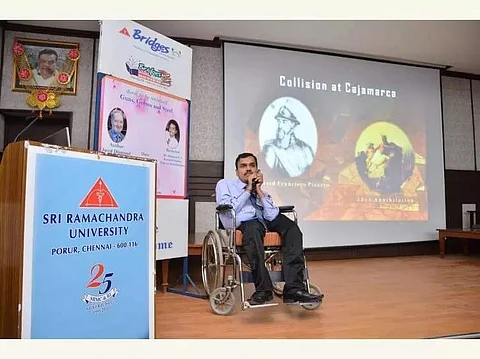

After 31 years of living with Spinal Muscular Atrophy, a rare disorder, Dr P A Abhinand, a professor of Bioinformatics at the Sri Ramachandra Institute of Higher Education and Research in Chennai, sees a ray of hope in a drug that India approved only in July this year. However, the cost of this life-long treatment is Rs 72 lakh per year. In the current health-policy paradigm, the only way for Abhinand to access this is through fundraising. He has set up a fundraiser on ImpactGuru, for which students and alumni from his college have been helping out.
The drug called Evrysdi (Risdiplam) is expected to stop the progression of Spinal Muscular Atrophy (SMA). He explains that things could have been very different, “I couldn’t crawl as a child so my parents took me to a neurologist, but due to lack of technology back then, I was misdiagnosed.” Which only happened when he was 13. “I have memories of playing cricket with my friends when I was 8. But, by the time I was 12, I was completely on a wheelchair and couldn't walk.” And that made things worse for him. “I had to depend on my friends and family to take me to school even though the school was in my neighbourhood,” says the Triplicane resident.
Abhinand says that if he had access to this drug earlier in life, his condition would’ve been much better today. Betraying a rare sense of humour, he says, “It is not like I would’ve ever been able to run or take part in the Olympics for that matter.” But, he adds, “I would have definitely been able to stand or walk slowly.”
At the moment, he can use his mouth and hands to some extent, which had helped with his career path. He loves being a teacher, and in fact, the student council and alumni at SRIHER are helping spread awareness about his fundraiser. “If I don’t get this medicine, that’ll cease to be the case and my complete identity as a teacher and a scientist will be lost,” Abhinand says.
Books changed his life
Back when he was growing up, as cricket was no longer an option, he took refuge in academics and that paid off eventually. But, his tryst with the world of science was only possible because of three people — the first two being his parents — he lost his father eight months ago to a blood clot in his brain — Richard Dawkins. “I was in Class 10 when my mother got me this book called The Selfish Gene by Richard Dawkins,” he says. That one book defined what the rest of his life would look like and he believes that the book will continue to live inside him. “Ever since I read that book, I had this absolute love for genetics and I wanted to be a biologist,” he says.
By the time the professor finished his undergrad degree in Biotechnology, his hands had grown weaker. “I could do my experiments while sitting in a wheelchair but then my hands started losing power,” Prof Abhinand says. “I wanted to take up a masters degree in Biotechnology too but there was no way I could do the experiments,” he adds. But, there was something that he could pursue without abandoning Biology entirely. “I settled for Bioinformatics. It is a field that tries to solve biological problems using computational technology and algorithms,” the professor says. He started doing his PhD in 2011 and went on to be a part-time teacher in 2015. It was only in 2019 that he became a full-time faculty member at the institute. “I could have gone abroad and pursued my PhD there but because of my disability, I couldn't travel alone.”
How bad is the pain?
He has known pain for as long as he has known this disease. His hands hurt. His shoulders and limbs hurt. He experiences severe rheumatic pain. “I have a spinal curvature. By the time I come back home from college, I have excruciating back pain as I have to sit all day. If I use my phone for a long time, my thumbs get very numb,” Abhinand says. He also has frequent respiratory issues, he says, “If I get COVID, I have a greater risk of complications. But because I work in a medical university, I got my two doses of COVID vaccine very early.”
He says right now it is his mother and his caretaker that help him out with day-to-day activities. “I can only use my cell phone and mouse right now. I want to retain what is left of me. I need to continue being a teacher, I need to continue serving my students. If that is taken away from me, I’ll be like a vegetable,” he says sombrely.
If you want to check out his fundraiser here is the link.
